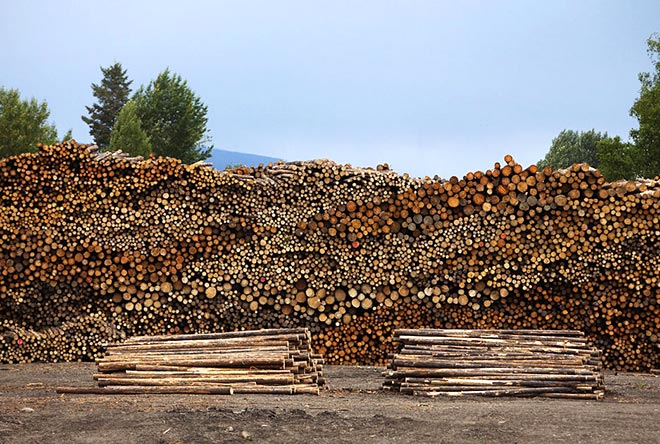
The ringgit falling to its 17-year low earlier this week was a boon for Sarawak’s timber players as timber products are mostly exported and priced in the US dollar.
KUCHING: The ringgit falling to its 17-year low earlier this week was a boon for Sarawak’s timber players as timber products are mostly exported and priced in the US dollar.
Analyst Saw Xiao Jun from the research division of CIMB Investment Bank Bhd (CIMB Research) observed that the ringgit has fallen nine per cent year to date and 20 per cent year on year (y-o-y) against the US dollar to RM3.81 per US$1.
“Yet, timber products in US dollar terms have remained stable or inched up slightly year to date on tightening supply,” Saw said in a note yesterday.
“On top of that, the currencies of India and Japan – the biggest importers of tropical log and plywood in the world – have also remained relatively stable against the US dollar. To note, the rupee has fallen by only one per cent against the dollar while the yen declined three per cent year to date.”
According to Japan Lumber Report, the supply of tropical logs in Sarawak has been tight due to the state government’s efforts to fight illegal logging. This has pushed up the freight on board (FOB) prices of Meranti Regular — the benchmark price for Sarawak logs — from US$270 to US$95 per cubic metre in December 2014 to US$290 to US$295 per cubic metre in July this year.
Meanwhile, trade data from Japan’s customs shows that the cost, insurance and freight (CIF) prices of plywood imported from Malaysia averaged at US$572 per cubic metre in May 2014, which is only two per cent lower than the average price of US$584 per cubic metre in December.
“We are keeping our price forecasts for plywood at US$580 per cubic metre and Meranti Regular at US$295 per cubic metre for 2015,” Saw said, adding that the price performances of these timber products broadly meet with CIMB Research’s expectations.
Looking at Sarawakian timber corps, CIMB Research said there was an upside to its projections of Jaya Tiasa Holdings Bhd (Jaya Tiasa) and Ta Ann Holdings Bhd’s (Ta Ann) timber earnings as it had assumed an exchange rate of RM3.70 to US$1 in its earnings models.
“This is in line with our current house’s view but lower than the spot US dollar to ringgit rate of 3.81,” the analyst added. “ Should the current exchange rate persists, we may raise our FY15 to FY17 net profit forecast for Jaya Tiasa by 11 to 30 per cent and Ta Ann by six to 13 per cent.
“We are likely to maintain our recommendations even if we raise our earnings forecasts for Jaya Tiasa and Ta Ann because of the weak crude palm oil and palm kernel prices”
The analyst also believed the stronger timber earnings will have limited impact on their share prices due to the weak crude palm oil and palm kernel prices, which have fallen nine per cent y-o-y and 10 per cent y-o-y, respectively.
In CIMB’s sum-of-parts (SOP) valuations for Jaya Tiasa and Ta Ann, palm oil assets made up 52 per cent and 45 per cent of their respective SOPs.
“Next month, Jaya Tiasa will report its 4QFY6/15 results while Ta Ann its 2QFY12/15 results. Jaya Tiasa’s plantation division may return to profit due to higher seasonal fresh fruit bunch output, but the division may still report a full-year loss for FY6/15 due to weak performance in previous quarters,” it suggested.
“Ta Ann should also report stronger quarterly palm oil earnings due to higher seasonal fresh fruit bunch output but the performance could be uninspiring as crude palm oil and palm kernel prices in April to June have fallen by three per cent qoq and 15 per cent wuarter on quarter respectively.”
On this point, CIMB Research kept our reduce call on Jaya Tiasa due to the concern on its weak estate productivity and its hold call on Ta Ann due to limited share price upside.
“Between these two players, we prefer Ta Ann as we project it will offer a decent dividend yield of 4.7 per cent in FY15. Investors who seek greater share price upside should switch to the pure downstream timber players.”
